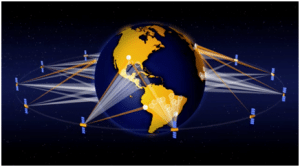Latest News
[Via Satellite 07-13-2015] High Throughput Satellite (HTS) capacity will play a critical role in unlocking new markets for the satellite industry as the rate of growth for traditional Fixed Satellite Service (FSS) capacity slows, according to a study from Northern Sky Research (NSR). The firm’s “Global Satellite Capacity Supply & Demand, 12th Edition” report projects demand for more than 7,700 transponders of traditional C-, Ku-, and widebeam Ka-band FSS capacity globally by 2024. NSR forecasts more than 3 terabits of GEO-HTS, MEO-HTS, and LEO-HTS bandwidth demand across a series of applications ranging from data to broadband access to mobility.
The report estimates a Calculated Annual Growth Rate (CAGR) of less than 2 percent for traditional FSS demand due to waning growth and declining prices in traditional FSS markets, leading to a need for new markets in which HTS has greater applicability.
NSR expects C-band additions to slow to less than 100 transponders annually in the next few years. Ku-band supply, on the back of video applications, will see more than 1,700 transponders added cumulatively by the end of the decade, but slow down thereafter. The research firm notes that most operators have jumped straight to Ka-band GEO-HTS where there is enough spectrum for growth, with tens of gigabits being added every year.
“More than 2.7 terabits of GEO-HTS supply will be available by 2024, of which more than 80 percent will be Ka band,” said Prashant Butani, senior analyst at NSR and co-author of the report. “In a few years, HTS will be to data traffic what widebeam Ku band is to video applications today — the workhorse bandwidth with growing competition lowering the cost of access.”
NSR indicates LEO-HTS has the “biggest wildcard” since, if one or more proposed systems are successful, they would flood the market with terabits of supply at a lower price per bit than what is typically offered today.
Get the latest Via Satellite news!
Subscribe Now